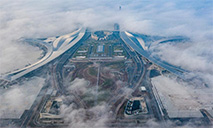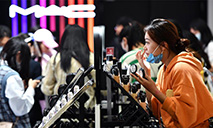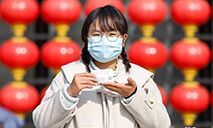Tianjin fights China’s first real battle against Omicron, puts Beijing on high alert
North China's Tianjin Municipality, home to 15 million people and also a major gateway to Beijing, started massive nucleic acid testing early Sunday morning, ramping up a swift response to the new Omicron variant after the city detected 20 COVID-19 infections in a single day, with two identified as carrying the new variant.
Epidemiologists said it's the first real battle against Omicron on the Chinese mainland as domestically-transmitted cases linked to the strain were discovered in local communities for the first time. The sudden outbreak also put adjacent Beijing on alert, creating huge uncertainty and high possibility of a spillover as the source of the outbreak remains unknown. But epidemiologists assured that as long as rapid tracing of the origin of the new viral chain is conducted and effective measures are put in place, the outbreak is expected to be extinguished before China's Spring Festival and 2022 Winter Olympic Games, which are only few weeks away.
Tianjin reported on Sunday night another 20 people who tested positive for COVID-19, all from the city's Jinnan district. They were sent to hospitals for further diagnosis and treatment. It is not clear whether they were infected with the Omicron variant.
Tianjin discovered two locally transmitted cases involving the Omicron variant, which were identified among individuals who volunteered to be tested Saturday. A further 18 cases were found in a follow-up tests of high-risk groups. The Tianjin municipal government said the two cases were part of the same transmission chain, but are not linked with the imported Omicron case detected in December, 2021 in the city.
The two Omicron infected individuals had not travelled outside the city recently, and it remains unknown whether the other 18 residents are also carrying the Omicron variant.
Among the 20 infected people, 15 are children aged between 8 and 13. The cases are concentrated in Tianjin's Jinnan and Nankai districts. A residential building in a compound in Jinnan was designated as high-risk of transmissions while three other residential buildings in this compound and two buildings in another compound are medium-risk.
Tianjin on Sunday night required residents not leave the city unless necessary. Those who have to leave should have a negative nucleic acid test results valid in 48 hours and green health codes and seek approvals by their employers or communities.
The city also strengthened checks on resident traveling to Beijing by setting check points and special channels at highways and transportation stations.
Fight with Omicron
To ensure public safety and containing Omicron from spreading further, residents in the city are required to remain in place and undergo nucleic acid testing. The city-wide testing began at 7 am on Sunday morning and is expected to complete within 24 hours, according to a notice from the city's anti-epidemic command center.
As of Saturday night, Tianjin had quarantined 75,680 people. Among 70 environment tests, 14 were positive and two were detected in elevators within residential buildings.
Tianjin municipal government said on Sunday that it will update nucleic acid test information of fever clinics every two hours, which impressed netizens for the city's efficient and organized way in dealing with the outbreak.
The health code of residents who don't receive a nucleic acid test within 24 hours will be changed to orange, which means the person is restricted from entering public places, including subway and buses. Residents who have been vaccinated within the last 48 hours will not participate in the test, the command center confirmed.
The anti-epidemic command center said at an urgent meeting at wee hours Sunday, which also included city Party chief Li Hongzhong and mayor Liao Guoxun, that mass testing must be carried out rapidly to fulfill the responsibility of Tianjin as a "moat" for Beijing and contain the epidemic at the fastest speed and the lowest cost. Mass testing will allow officials to gain a better understanding of the current landscape and ensure the safety and health of residents, the command center said.
Based on the patients and viral transmission chain, the virus has spread across three generations among the newly confirmed 18 infections, suggesting the virus probably has circulated among the community for a certain period of time, Zhang Ying, a deputy director of the municipal health commission, said at a late press conference on Saturday night. More positive infections are expected to be uncovered, Zhang said.
Affected by the flare-up, subway lines one and six will be partially closed starting from Sunday. Tianjin Binhai International Airport has cancelled 144 flights.
Preparing for a potential lockdown, several Tianjin residents told the Global Times that people rushed to markets to snap up food. A resident surnamed Liu said that a supermarket near her home was full of people at 7 am on Sunday morning, with the queue stretching 200 meters.
Another resident surnamed Wang said most vegetables were sold out early on Sunday morning, and the delivery service for nearby market was suspended.
Liu said that although the outbreak came so suddenly, she appreciated the local government's swift response. She added that the overnight nucleic acid testing "assures people."
Tianjin's bureau of commerce issued a notice on Sunday saying that two districts of the city launched emergency plan to ensure market supply. Current vegetable stocks are enough to feed the city for three to four days; stock of rice, flour and edible oil in Tianjin are able to meet 30 days of demand.
The Global Times learned that two biggest universities in Tianjin, Tianjin University and Nankai University, both with branches in Jinnan district, where the latest cases were mostly found, have imposed restrictions on leaving and entering of their campuses. Tianjin University notified students on Sunday that it has postponed final examinations until next semester.
A Beijing-based immunologist told the Global Times that it's the first real battle against Omicron on the Chinese mainland as Omicron-infected domestically-transmitted cases were discovered in local communities for the first time, and that huge uncertainties exist as the source of the current outbreak remains unknown. He believes imported goods to be the likely source of infection. If the Omicron virus has spread three generations in the community, Tianjin's COVID-19 cases will increase rapidly and reach 100 soon, he said.
Speaking at a Saturday conference, Zhang Wenhong, a leading infectious disease expert in Shanghai said that it is groundless that some Chinese self-media are saying that the new variant is causing relatively minor symptomscompared to previous strains, and he also didn't agree that Omicron is just "enhanced influenza."
He said that after researching the medical imaging of the new variant, he felt safe to say that Omicron has fought human's immunological system and won.
The immunologist warned of the risks that the Tianjin outbreak would pose to Beijing, because of a large number of people who commute between the two cities.
Beijing on alert
The Beijing Center for Disease Control and Prevention on Sunday suggested people in Beijing do not visit Tianjin and those in Tianjin refrain from travelling to the capital. Commuters between Tianjin and Beijing, estimated around 100,000 as of 2020, are encouraged to work from home.
Anyone in Beijing who had visited Jinnan and Nankai districts of Tianjin since December 23, 2021 will be subject to home quarantine and be tested. Others who had travel history to Tianjin since the date mentioned above were asked to report to local community officials, employers and hotels immediately, the center said.
An employee from a nucleic acid testing point in Beijing's Chaoyang district told the Global Times that demand for testing had spiked on Sunday. A Beijing resident surnamed Liao who went to Tianjin last week told the Global Times that she volunteered to take a test after hearing what happened in Tianjin. "A negative test assures not only me, but my family and colleagues. I will stay at home for some days and won't cause trouble for the public."
Entry checkpoints from Tianjin to Beijing have implemented heightened epidemic inspection protocols. Commuters are being asked to contact their employers and communities and sign up a letter of commitment before they are allowed to enter Beijing. Many vehicles and people were persuaded to return. Some residents who returned to Beijing from Tianjin over recent days have been asked to quarantine at home. The inter-city train between Tianjin and Beijing is operating normally as of press time.
Apart from Tianjin, China has seen sporadic outbreaks in other cities and provinces. In total, 92 locally confirmed COVID-19 cases were reported on Saturday, scattered across Henan Province, the city of Xi'an, Ningbo and Shenzhen.
The coronavirus is more likely to cause an outbreak and infection during winter, that's why China is seeing more frequent outbreaks at the moment, Yang Zhanqiu, a deputy director of the pathogen biology department at Wuhan University, told the Global Times.
Yang said that one thing for sure is that it is important to identify the source of an outbreak and time frame of infection as soon as possible. "As soon as the source and time of when the virus arrived in China are identified, larger scale of spillover can be controlled," he said.
The virologist said that city-wide nucleic acid testing is the quickest way to find cases and prevent further spreading. "The virus has four to five dormant days, number of confirmed cases will keep climbing in the future," said Yang, noting that it remains unknown how long the virus has been circulating in Tianjin, and it is possible it's already spilled over into other provinces.
Yet experts are confident about China's current dynamic zero-COVID strategy, saying that Beijing and other cities are on high alert in regard to Tianjin and flare-ups occurring elsewhere, and that the outbreak in Tianjin will not breach the capital.
"Now it is only three weeks away from China's Spring Festival, if we can pinpoint the source and take corresponding measures, the outbreak in Tianjin will be extinguished in time," Yang said.
Photos
Related Stories
- Pandemic, blizzard haunt U.S. as Omicron smashes Europe
- Interview: Omicron teaches Australia painful lessons, says virus expert
- COVID-19 infections surge in European countries as Omicron spreads
- New pandemic records hit as U.S. struggles against Omicron
- Hong Kong, Australian universities discover T cells effective to tackle Omicron
Copyright © 2022 People's Daily Online. All Rights Reserved.










